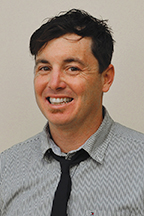Cameron Painter
 Office: NHB 416, Omak campus
Office: NHB 416, Omak campus
Phone: 509-422-7849
Email: cpainter@wvc.edu
A.A., Columbia Basin College
B.A., Washington State University
M.Ed., Concordia University
Cameron began teaching Transitional Studies-Mathematics at WVC at Omak in 2016.
From the WVC Discover magazine, winter 2017:
Cameron Painter teaches developmental math at Wenatchee Valley College at Omak. Ironically, math was one of his least favorite subjects in school.
“It wasn’t so much learning that I didn’t like; it was the structure of school,” he said. His math classes, he explained, had a “here’s a rule and you need to remember this” structure, without clarifying why he needed to remember or how the mathematics would be utilized.
Cameron grew up in the Tri-Cities and graduated from high school, but he didn’t feel challenged by his education and didn’t particularly enjoy it. He began working in road construction rather than going to college. “I’d go home and I’d devour books, because I wasn’t being intellectually stimulated at all,” he said.
He enrolled at CBC and took early morning and night classes. Rather than complain about the problem, Cameron decided to become part of the solution and decided he would become a teacher. He received bachelor’s and master’s degrees in education, but his teaching career didn’t begin right away. Cameron worked in ski and snowboard sales but transitioned to teaching after injuring himself. An active outdoorsman, he and his family moved to the North Cascades to be closer to the mountains and the activities he enjoys—kayaking, rock climbing, snowboarding and trail running.
Cameron worked for ten years as a middle school math teacher in the Omak School District and for four years as part-time instructor at WVC at Omak. He became a full-time instructor at the Omak campus this fall. “I felt like I could have more impact with my college students by having an on-campus presence,” he said.
Cameron believes in the motto, “Be the change you want to see in the world.” He hopes to help students become more enthusiastic about math. He provides a rational approach to teaching math: here is what students are learning, why they’re learning it and where they’ll use it. He gives real world examples that students could relate to—such as the cost of a date night.
He encourages students who are struggling in their math classes to “be honest with yourself and be honest with your instructors and advisers. We are here for you, but we can’t help you if you don’t let us know.”


